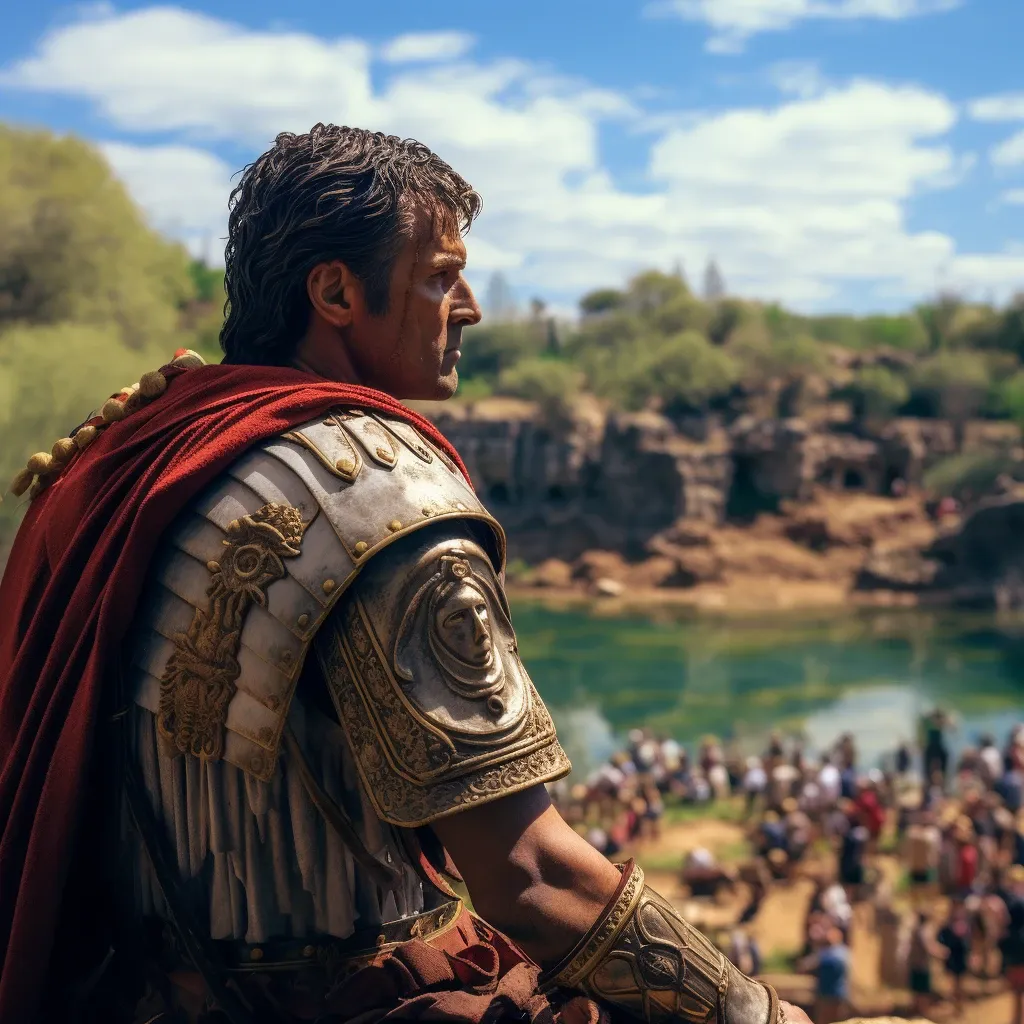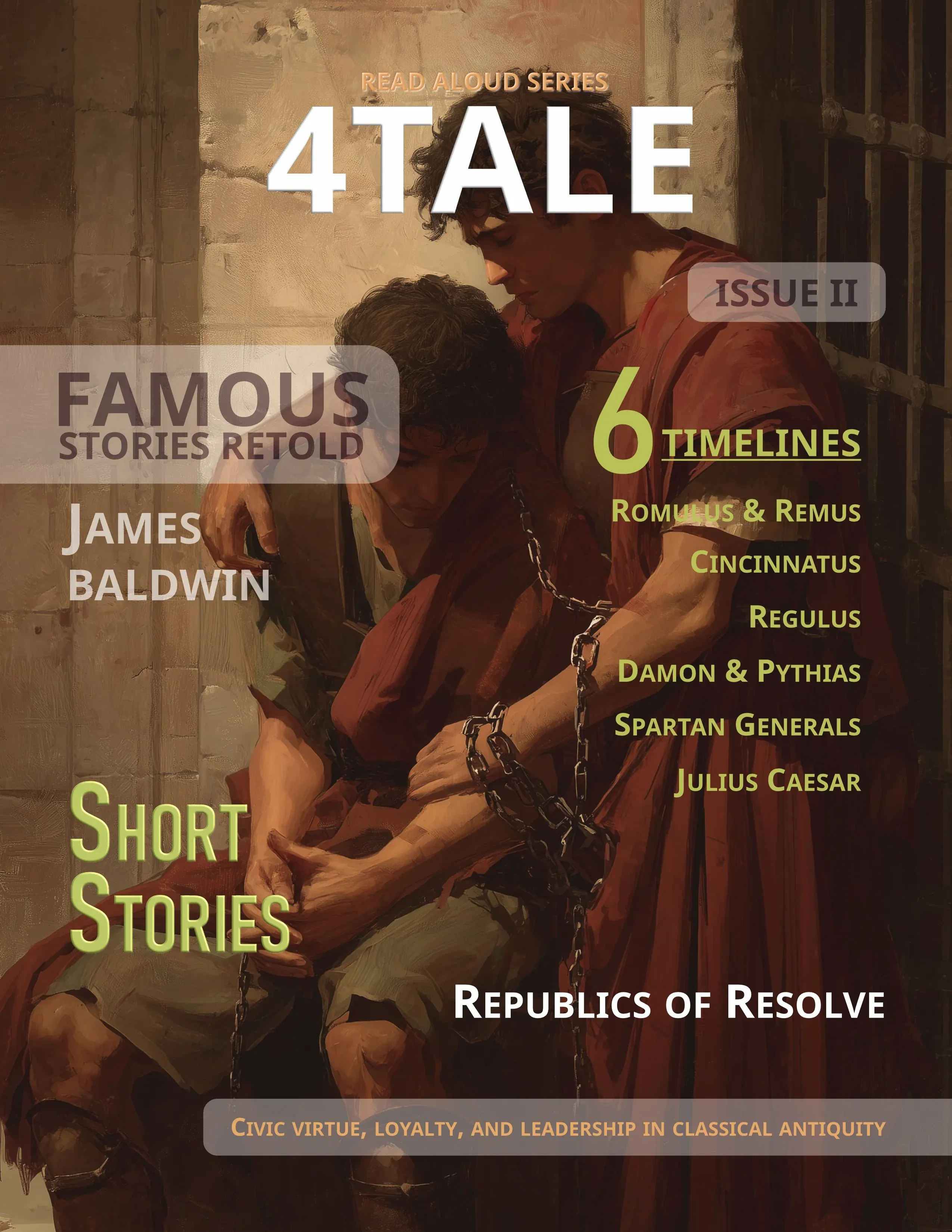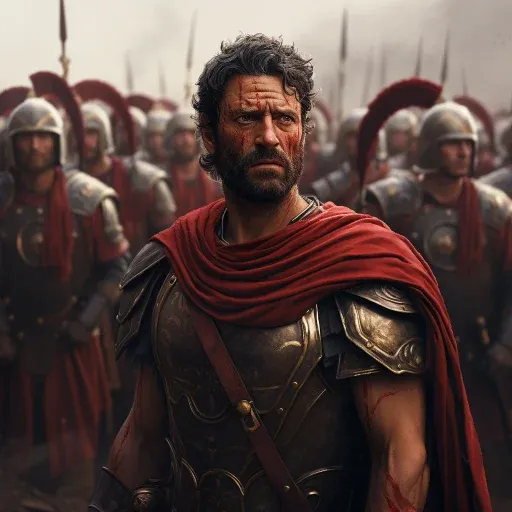BY JAMES BALDWIN
Crossing the Rubicon
Famous Stories Retold: Story 28 of 30

Heading

Julius Caesar’s Decision: In 49 BC, Julius Caesar crossed the Rubicon River with his army, defying the Roman Senate and sparking a civil war.
Point of No Return: The phrase "crossing the Rubicon" signifies a decisive and irreversible step, as Caesar’s action marked the point of no return in his conflict with Pompey and the Senate.
A good book we like, we explorers. That is our best amusement, and our best time killer
- Roald Amundsen, Explorer
Caesar's Rubicon: A Historic Power Shift
Intrigue, power plays, and pivotal moments that changed the course of history - such was the gambit of Julius Caesar. His audacious crossing of the Rubicon River not only asserted his defiance against the Roman Senate, but it also set in motion a series of events that would forever alter the power dynamics of Ancient Rome. Through this exploration, we delve into the political maneuverings and the monumental impact of this significant event. Prepare to be transported back in time, unraveling the threads of history, and understanding the profound implications of a single crossing.
The Rise of Rome: An Empire of Unmatched Power
Rome, once a small city-state, had ascended to a position of unprecedented strength. The Romans, through their military brilliance and diplomatic savvy, had managed to vanquish all nations to the north of the Mediterranean Sea and a majority on the south. This also included the islands and the part of Asia that is modern-day Turkey. Rome's power was unparalleled, its reach was vast, and its influence was profound.
Julius Caesar: A Man of Courage and Energy
Among the many noteworthy figures in Roman history, Julius Caesar stands tall. Known for his remarkable courage and tenacity, Caesar was entrusted with a significant task - to conquer Gaul (present-day France) for Rome. The land was inhabited by various warlike tribes who resisted Caesar's forces fiercely. However, they were ultimately overcome by the strategic brilliance of Caesar. His nine-year service in Gaul expanded Roman dominion and introduced Britain, then wild and uncivilized, to the known world.
Podcast
The Jealousy and Fear of Caesar's Enemies: Pompey's Power Play
Despite his noteworthy achievements, Caesar was not without adversaries. His successes incited jealousy among his contemporaries, one of whom was Pompey. Once the most powerful man in Rome, Pompey foresaw the threat posed by Caesar's rising influence. His own army had done little to command the public's appreciation, in stark contrast to Caesar's. Understanding the potential for Caesar to surpass him, Pompey began scheming to counteract his rival.
The Roman Senate's Command: A Plot to Ruin Caesar
In the heart of Rome, Pompey and other enemies of Julius Caesar engineered a devious plan to halt his rising power. These cunning plotters used the Roman Senate as their tool, sending forth a command to Caesar - a command that was nothing less than a veiled threat. They ordered Caesar to leave his army in Gaul and return to Rome, under the pretense of loyalty to the Republic.
But Caesar was no fool and understood the implications of this command. If he were to comply, he would be left defenseless in the den of his enemies, facing false accusations, trials for treason, and the ultimate blockage of his rise to consulship. With his enemies amassing against him, Caesar turned to the only allies he could trust - his loyal soldiers.

The March to Italy: Caesar's Loyal Legion and the Crossing of the Rubicon
Caesar shared the plot against him with his favorite legion, the soldiers who had followed him through countless battles and shared in his victories. Their loyalty did not waver. They pledged to stand by Caesar, promising to follow him into Rome without pay, even sharing the costs of the march. Their loyalty gave Caesar the support he needed to make a fateful decision - the decision to cross the Rubicon.
The Rubicon, a small river, marked the boundary of Caesar's province of Gaul. To cross it would be to directly defy the Senate's command - a declaration of war. Yet, Caesar did not shy away. He led his army across the Rubicon, his bold action symbolizing the irreversible decision he had made. With the crossing, there was no turning back.
The Aftermath of the Crossing: The Flight of Pompey and the Mastery of Caesar over Rome
The news of Caesar's crossing of the Rubicon spread like wildfire, causing shockwaves amongst his enemies in Rome. Pompey's soldiers, sensing the shift in power, abandoned their commander to join Caesar's victorious march. The senators and public officers who had hoped to bring Caesar down were now fleeing in fear, leaving their homes and positions behind in their haste to escape.
As the city descended into chaos, Pompey himself was forced to flee to Greece, leaving Caesar as the undisputed master of Rome. The crossing of the Rubicon not only marked a turning point in Caesar's career but also a significant shift in the power dynamics of Rome.
Conclusion
The crossing of the Rubicon was not just a physical journey for Caesar; it was a bold assertion of his power and the beginning of a dramatic shift in Rome's political landscape. As Caesar's loyal soldiers followed him, the balance of power teetered, causing fear and hasty flight among his enemies. This audacious act, which seems simple in its execution, was a monumental step in altering the course of Roman history. It demonstrated that the will of a single determined individual could challenge, and ultimately change, the established order. This event underscores the often unpredictable and profound impact of individual action on the course of history.





